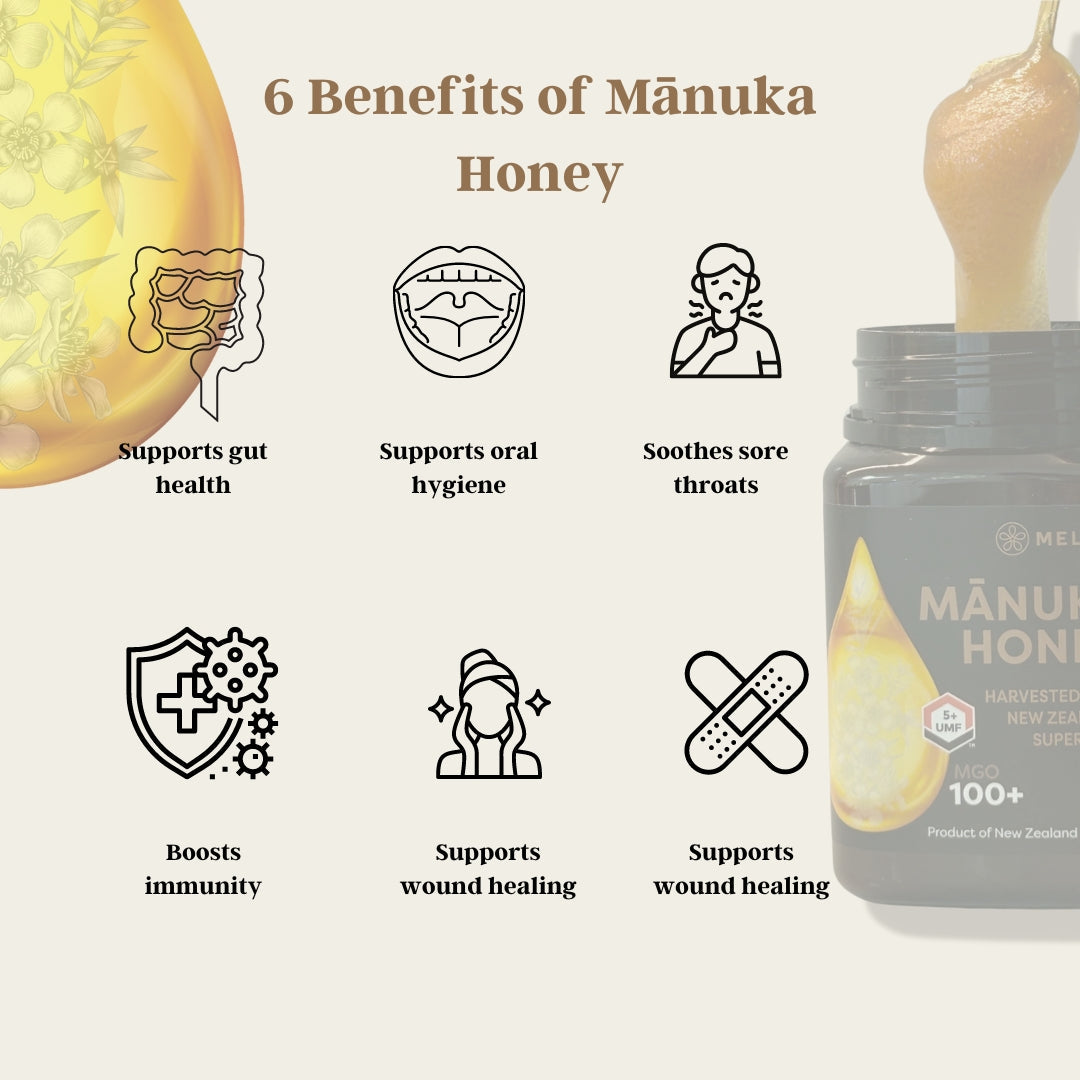Mānuka honey has gained significant attention in recent years for its unique properties and health benefits. Unlike regular honey, Mānuka honey is known for its potent antibacterial and anti-inflammatory effects. This article looks at what Mānuka honey is, its origins, the reasons behind its health benefits, and its advantages over regular honey.
What is Mānuka Honey?
Mānuka honey is a type of honey native to New Zealand and Australia, derived from the nectar of the Mānuka plant (Leptospermum scoparium). The Mānuka plant, a relative of the tea tree, produces flowers that bees pollinate, resulting in the creation of this distinct honey. What sets Mānuka honey apart from other varieties is its high concentration of methylglyoxal (MGO), a compound responsible for many of its therapeutic properties.
Origins of Mānuka Honey
The origins of Mānuka honey are deeply rooted in New Zealand's natural landscape. The Mānuka plant thrives in the wild, rugged terrains of New Zealand, particularly in regions like Northland and East Cape. Indigenous Maori communities have long recognised the medicinal properties of the Mānuka plant, using its leaves and oil in traditional remedies. The process of making Mānuka honey begins with bees collecting nectar from Mānuka flowers. The nectar is then converted into honey and stored in the hive, where it matures, enhancing its unique qualities.
6 Health Benefits of Mānuka Honey
Antibacterial Properties
Mānuka honey is renowned for its robust antibacterial effects, attributed primarily to its high MGO content. MGO is derived from the conversion of dihydroxyacetone (DHA) found in Mānuka flower nectar. Studies have shown that Mānuka honey can inhibit the growth of various bacterial strains, including Staphylococcus aureus and Escherichia coli, making it a valuable natural remedy for infections and wounds.
Anti-inflammatory Effects
Inflammation is the body's natural response to injury or infection, but chronic inflammation can lead to various health issues. Mānuka honey has been found to reduce inflammation, promoting faster healing of wounds and reducing pain and swelling. Its anti-inflammatory properties are beneficial in treating conditions like eczema, arthritis, and gastrointestinal inflammation.
Wound Healing
Historically, honey has been used for wound care due to its natural antiseptic properties. Mānuka honey, in particular, has been shown to accelerate wound healing, reduce infection rates, and promote tissue regeneration. Its high viscosity forms a protective barrier over wounds, maintaining a moist environment that facilitates healing.
Digestive Health
Consuming Mānuka honey can also improve digestive health. It has prebiotic properties that support the growth of beneficial gut bacteria, aiding digestion and nutrient absorption. Mānuka honey has been used to treat conditions like acid reflux, gastritis, and irritable bowel syndrome (IBS), providing relief from symptoms and promoting gut health.
Immune System Support
Mānuka honey's antimicrobial and anti-inflammatory properties contribute to a strengthened immune system. Regular consumption can enhance the body's natural defences, making it more resilient to infections and illnesses. It also contains antioxidants that help combat oxidative stress and support overall health.
Oral Health
Surprisingly, despite its sweetness, Mānuka honey can benefit oral health. Its antibacterial properties can reduce harmful bacteria in the mouth, preventing plaque formation, gingivitis, and tooth decay. It also soothes inflamed gums and can be used as a natural remedy for sore throats.
Is it Good to Eat Mānuka Honey Every Day?
Incorporating Mānuka honey into your daily diet can offer numerous health benefits, but moderation is key. Consuming one to two teaspoons of Mānuka honey daily is generally considered safe and beneficial. This amount can help support the immune system, improve digestive health, and provide a natural source of energy. However, due to its high sugar content, excessive consumption should be avoided, particularly for individuals with diabetes or those watching their sugar intake.
Mānuka Honey vs. Regular Honey
Nutritional Profile
While both Mānuka honey and regular honey contain natural sugars, vitamins, and minerals, Mānuka honey boasts a higher concentration of unique compounds like MGO and hydrogen peroxide, enhancing its antibacterial and medicinal properties.
Therapeutic Uses
Regular honey offers general health benefits and is often used as a natural sweetener and home remedy for minor ailments. Mānuka honey, on the other hand, is specifically valued for its potent antibacterial, anti-inflammatory, and wound-healing properties, making it more effective for therapeutic uses.
Taste and Texture
Mānuka honey has a distinct, earthy flavour and a thicker, creamier texture compared to regular honey. This unique taste profile can be attributed to the Mānuka flowers from which the nectar is harvested.
Scientific Validation
Numerous scientific studies have validated the health benefits of Mānuka honey, particularly its antibacterial and wound-healing properties. While regular honey is also beneficial, Mānuka honey's specific therapeutic effects are backed by more extensive research.
Conclusion
Mānuka honey stands out as a remarkable natural product with a wide array of health benefits. Its antibacterial, anti-inflammatory, and wound-healing properties make it a valuable addition to both traditional and modern medicine. While regular honey offers general health benefits, Mānuka honey's unique properties provide enhanced therapeutic effects.
Melora: Award-Winning New Zealand Mānuka Honey
For those seeking high-quality Mānuka honey, Melora is a distinguished supplier renowned for our premium honey products. At Melora, we offer a diverse range of award-winning New Zealand Mānuka honey, wellness products, and skincare items. Our commitment to quality and sustainability ensures that consumers receive the finest Mānuka honey. Our products are not only beneficial for health but also support the preservation of New Zealand's unique ecosystems and the wellbeing of local communities.

